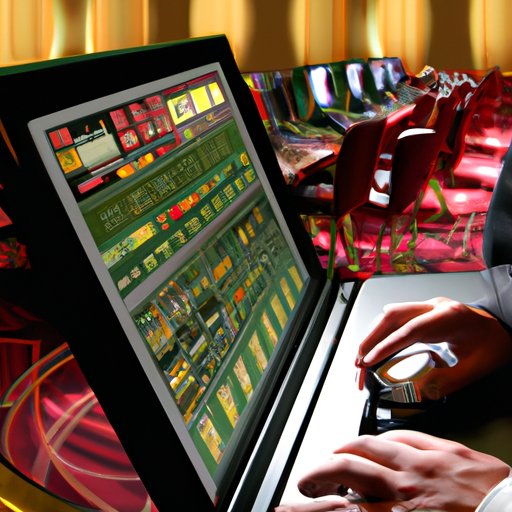Introduction
If you are a regular casino-goer or someone who is simply curious about the ins and outs of the gambling industry, you may wonder how casinos manage to stay in business and make a profit. This article provides a comprehensive overview of how casinos generate revenue, the psychological tricks they use to keep players coming back, and the importance of technology in modern casinos. Whether you are a casual gambler or a budding entrepreneur considering investing in a casino, this article is chock-full of useful information to help you better understand the casino business model.
Overview of the Casino Business Model
Casinos generate revenue from a variety of games, including slots, table games, poker, and sports betting. Each game has a built-in “house edge,” which refers to the percentage of each bet that the casino expects to keep over time. This means that even when a player wins, the casino still makes a profit over the long term. The percentage payouts are determined by regulators and vary based on the game and the location.
In addition to the costs associated with maintaining staff, utilities, and equipment, casinos also have to pay licensing fees and taxes to the government. These expenses can add up quickly, making it crucial for casinos to maximize revenue through player engagement and innovative strategies.
Psychological Tricks Used by Casinos
Casinos use a variety of psychological tricks to keep players at the machines or tables. One popular tactic is free drinks and entertainment, both of which keep players on the casino floor longer. The use of bright lights, loud sounds, and other sensory experiences to create an exciting atmosphere that encourages gambling is another common strategy.
Another strategy used by casinos is to create an immersive environment that makes it easy for players to lose track of time. This can include a lack of windows or clocks, and the use of mirrors and other reflective surfaces that create an illusion of space.

Importance of the House Edge
The house edge is a crucial factor in a casino’s profitability. By understanding the percentage payouts for each game and the built-in house edge, casinos can optimize revenue by adjusting game rules and payouts. For example, a casino might offer a new slot machine with a lower house edge to attract players and keep them coming back. Alternatively, a casino might tweak the rules on a table game to make it more advantageous for the house. Regardless of the specific strategy, a casino’s success largely depends on its ability to stay on top of changes in the market and pivot when necessary.

Loyalty Programs and Player Tracking Systems
Casinos use loyalty programs to incentivize players to gamble more and keep coming back. These programs typically offer players rewards and perks such as free hotel stays, meals, and bonus cash. In exchange, the casino collects data on the player’s gambling habits, allowing it to offer personalized experiences and targeted marketing campaigns.
Player tracking systems have become increasingly sophisticated in recent years, allowing casinos to collect data on everything from the player’s preferred games to the amount of time spent at each machine. This data can then be analyzed using artificial intelligence and other cutting-edge tools to optimize revenue, improve marketing efforts, and provide better experiences for players.

Role of Technology in Modern Casinos
Casinos are using technology to personalize player experiences and optimize revenue. This includes everything from digital signage and interactive displays to mobile apps and virtual reality experiences. Artificial intelligence is also being used to analyze player data and improve the efficiency of casino operations.
One example of this technology in action is machine learning algorithms that can predict which slot machines will be most popular based on factors such as game type, location, and time of day. This allows casinos to optimize their floor plans and ensure that the most popular games are always available.
Impact of External Factors
External factors such as economic fluctuations and competition from online gambling sites can have a significant impact on a casino’s profitability. During an economic downturn, for example, fewer people may be willing to gamble, and the casino may have to adjust its business strategy accordingly. Similarly, online gambling sites have become increasingly popular in recent years, posing a threat to traditional brick-and-mortar casinos.
One way that casinos are adapting to these changes is by combining online and offline experiences. This can include offering online versions of popular casino games, as well as mobile apps that allow players to earn rewards even when they are not on the casino floor. Additionally, casinos are finding ways to differentiate themselves from their online counterparts by focusing on unique experiences, such as live entertainment and fine dining.
Conclusion
Casinos have a unique business model that relies heavily on understanding customer behavior, optimizing revenue, and adapting to changes in the market. By using psychological tricks, loyalty programs, and cutting-edge technology, casinos are able to create an immersive and exciting experience for players while maintaining profitability. For those looking to better understand the casino business model, this article provides a comprehensive overview of the strategies and tactics used by casinos to maximize revenue and stay competitive in a rapidly evolving industry.
